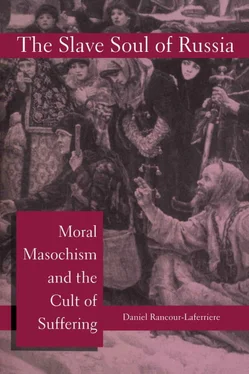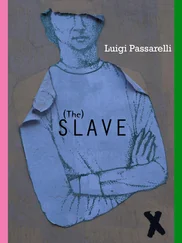A particularly rich source of evidence about the masochistic attitudes of real slaves comes from Russian folklore gathered before 1861, for much of the peasantry before that date belonged to the serf category. The proverb just mentioned, for example, comes from the classic collection of Vladimir Dahl (1801–72), published originally in 1862. Here are some other lessons in slavishness from that copious work:
Say you are guilty and bow down (or: lie down) (Govori vinovat, da poklonis’ [ili: da lozhis’]).
He submitted and fell at his feet as well (Pokorilsia da v nozhki poklonilsia).
Keep your head bowed and your heart submissive (Derzhi golovu uklonnu, a serdtse pokorno).
Beat with your forehead lower: the sky is too high and the face of the earth is nearer (Bei chelom nizhe: do neba vysoko, do litsa zemli blizhe).
Be quieter than water, and lower than grass (Tishe vody, nizhe travy).
Crawl and grovel face down before him (Polzkom pered nim da nichkom).
When they beat you, say thank you for the lesson (Pob’iut, tak skazhi spasibo za nauku).
Do the work of seven, but obey one (Delai svoe delo za semerykh, a slushaisia odnogo). 37
These utterances attempt to teach the peasant a sense of absolute sub-missiveness before authority. In pre-emancipation Russia this meant not only submissiveness before the peasant’s landlord (“barin”), but servility before anyone powerful generally, such as a government bureaucrat, a military superior, and so on. Note that some of the items are in two parts, the second part being a reinforcement of the first. In effect: one act of submission may not be enough, two are needed to convince the dominant party of the slave’s true servility, a servility of the heart as well as of gesture. Note also the “vertical” orientation of many of the sayings, the submissive party being well “below” the dominant party in the spatial configuration. Perhaps this is what Ivanov had in the back of his mind when he spoke of a Russian “law of descent.”
Some of the proverbs describe masochism of a slightly different sort, that is, outright self-destructive behavior:
He offers up the rod to be used against himself (On sam na sebia palku podaet).
He is braiding a whip (or: a rope) to be used against himself (On sam na sebia plet’ [ili: verevku] v’et).
The slave is beating herself if she does a poor job of reaping (Sama sebia raba b’et, koli ne chisto zhnet).
He covered his own beard with his spittle (Sam svoiu borodu opleval).
He stepped on the teeth of the rake and hit himself in the head (Nastupil na zub’ia—grabliami v lob). 38
Such evidence for masochistic attitudes in the Russian peasant would of course have to be matched with evidence for sadistic inclinations (“It’s fun to beat someone who is crying”) or rebellious feelings (“A judge’s pocket is like a priest’s belly”) in a balanced study of Russian proverbs.
Indeed, masochism is not the only feature of psychological interest in slaves. It is but one item in a spectrum of psychical phenomena which can be observed in the real slave, including that type of slave who lives in extremity in the forced labor camp, and who resorts to a variety of defenses—especially infantilization and identification with the aggressor—in order to overcome fear and survive physically. 39The primary concern of this book, however, is masochism.
It should be granted that some aspects of masochism, such as extreme servility, may be appropriate in the situation of direct contact with a powerful master who holds the key to all resources. The shuffling, obsequious muzhik, like the American Uncle Tom in the antebellum south, had something to gain from his servility—which, by the way, is not to say that all muzhiki were docile all of the time, or that all southern black slaves were Uncle Toms in all contexts.
In the political realm servility can be especially useful for obtaining resources and even power (and hence, the possibility of acting on sadistic fantasies). The sycophant uses a form of masochism to manipulate a superior, and as a result can even appear to be in control of the superior. The relationship with the superior is not truly reversed, however. For example, all the tsar had to do was kill or arrest a few important people, or just withdraw resources, in order to remind his boyars why they were sycophants. 40Or, all Stalin had to do was eliminate a few honest critics for most of the actors around him to turn servile.
In any case, masochism is no less masochism when it seems appropriate or adaptive in a given situation. It is important to recognize masochism for what it is, even as we never cease to be amazed by the multifarious uses to which it can be put.
Throughout this book Russia will be used not only as a metonymic designation of a geographic area occupied largely by ethnic Russians, 41but as a collective personification of the Russian people as well. Here I simply follow tradition. Russians tend to think of their country as a collective representation of themselves, as a person . Numerous common epithets indicate that Russia belongs to this category: “Mother Russia” (“Rossiia mat’,” “Matushka Rus’”), “Holy Russia” (“Sviataia Rus’”), “Motherland” (“Rodina”), “Fatherland” (“Otechestvo”), and many others which will appear in the following pages. Less common epithets are constantly being invented by Russian poets, but they have the same personifying effect, for example, Blok’s “Beggarly Russia” (“Nishchaia Rossiia”), Belyi’s “Deaf Russia” (“Glukhaia Rossiia”), Andreev’s “Shabby Russia” (“Ubogaia Rus’”), and so forth. 42Nowadays especially “sick Russia” is frequently encountered in the post-Soviet media.
The personification of Russia is a trope that is often extended, as when Russian soldiers are customarily referred to as “sons of the Fatherland,” or “true sons of Russia.” The poets especially are prone to take liberties in extending the personification. For example, Russia is a “female slave” (“raba”) in the following stanzas from a somewhat sadistic poem titled “Russia” (1915) by Maksimilian Voloshin:
Люблю тебя в лике рабьем,
Когда в тишине полей
Причитаешь голосом бабьим
Над трупами сыновей.
Когда сердце никнет и блещет,
Когда, связав по ногам,
Наотмашь хозяин хлещет
Тебя по кротким глазам.
I love you in the person of a slave,
When in the quietness of fields
You wail in a woman’s voice
Over the bodies of your sons.
How the heart droops and shines
When, having bound your feet,
The master lashes wildly
At your humble eyes. 43
The poets are not alone here. Respected scholars too will extend the personification of Russia to considerable lengths. Literary historian Dmitrii Likhachev, for example, likes to dwell on the generosity and goodness (“dobrota”) of a person called Russia:
Russian culture did not copy, but creatively dealt with the riches of world culture. This huge country was always in possession of a huge cultural heritage, and managed it with the generosity of a free and rich person [s shchedrost’iu svobodnoi i bogatoi lichnosti]. Yes, namely a person, for Russian culture and all of Russia with it constitute a person, an individual [iavliaiutsia lichnost’iu, individual’nost’iu]. 44
Some authors, especially those with a nationalistic or Slavophile bent, extend the personification while at the same time refusing to recognize the poetics of the extension. Vadim Borisov, for example, speaks of the nation’s person or personality (“lichnost’”), which is somehow distinct from the empirical and rationally analyzable manifestations of national life. In this view Russia is very much a literal human being:
Читать дальше












